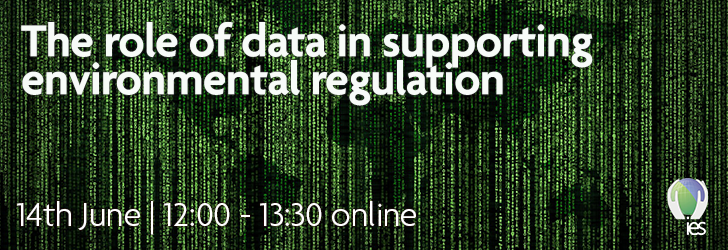Data and digital innovation will be a key part of realising environmental targets and ensuring compliance with environmental regulations. This event will explore the different ways that data can support environmental regulation and the ways in which this may change in the future:
Effective monitoring to improve environmental outcomes
The Office for Environmental Protection (OEP) monitors, critically assesses and reports on governments' progress in improving the natural environment in line with their Environmental Improvement Plans (EIPs), goals and targets. The OEP is required by our enabling legislation to produce an annual report on progress and this assessment and scrutiny underpins the delivery of the EIPs and targets in law. Effective monitoring can drive improvement of environmental outcomes and how the OEP is developing our approach to monitoring and evaluating Government’s progress will be presented.
Implementation of Biodiversity Net Gain and Local Nature Recovery Strategies: What data is needed to ensure BNG and LNRS deliver for nature?
Several new environmental policies were introduced by the Environment Act 2021, including mandatory Biodiversity Net Gain (BNG) and Local Nature Recovery Strategies (LNRSs). However, for these new policies to genuinely deliver for nature, they must be informed and directed by good environmental data, supported by adequate environmental data infrastructure, and subject to robust monitoring, reporting and enforcement.
Future of Digital EIA and monitoring of the EIA outcomes
This presentation will discuss the benefits of using a centralised database to hold all EIA related data, including impact assessment information. The use of an EIA database approach is considered to have wide benefits, through from project outset to build-out and operation. An EIA Database approach would provide greater clarity on mitigation, allowing for more effective monitoring of the EIA.
This panel discussion has been organised as part of the 'The regulatory landscape' theme of the IES's Future of ES23 horizon scanning & foresight project.
Our speakers
 Emma Clarke is a policy officer at Wildlife and Countryside Link, a coalition of environment charities in England. She covers sites and species policy and land use planning policy for Link. She was previously a marine biologist, conducting analyses of oceanic acoustic data to monitor cetaceans. She has a Master’s degree in History and Philosophy of Science from Cambridge University and a BSc (Hons) in Biology from Dalhousie University in Halifax, Canada.
Emma Clarke is a policy officer at Wildlife and Countryside Link, a coalition of environment charities in England. She covers sites and species policy and land use planning policy for Link. She was previously a marine biologist, conducting analyses of oceanic acoustic data to monitor cetaceans. She has a Master’s degree in History and Philosophy of Science from Cambridge University and a BSc (Hons) in Biology from Dalhousie University in Halifax, Canada.
Emma Jenkins is a Principal EIA Consultant at WSP where she is the UK Digital EIA lead. This role involves developing the digital capabilities of environmental assessments, including: the creation of digital reports and automated assessment reporting, and utilising digital tools to generate efficiencies in assessments. Her primary area of expertise is the preparation and coordination of environmental impact assessments (EIA) for infrastructure schemes in the energy and highways sectors. Emma is co-chair for the Institute of Environmental Management and Assessment (IEMA) Digital Impact Assessment Working Group. Her work on this group includes co-authoring guidance for EIA professions to follow for when undertaking a Digital EIA.
the digital capabilities of environmental assessments, including: the creation of digital reports and automated assessment reporting, and utilising digital tools to generate efficiencies in assessments. Her primary area of expertise is the preparation and coordination of environmental impact assessments (EIA) for infrastructure schemes in the energy and highways sectors. Emma is co-chair for the Institute of Environmental Management and Assessment (IEMA) Digital Impact Assessment Working Group. Her work on this group includes co-authoring guidance for EIA professions to follow for when undertaking a Digital EIA.
 Dr Cathy Maguire has recently joined the OEP as Head of Assessments with a focus on monitoring, critically assessing and reporting on governments' progress in improving the natural environment. From 2011 she worked at the European Environment Agency focusing on integrated assessments, systems and sustainability assessments and learning and development. She had responsibilities for design, coordination and lead authorship of the State and Outlook for the European Environment Reports (SOER) in 2015 and 2020. Cathy has over 20 years’ experience in developing knowledge that supports policy and decision making and has worked in the public and private sectors, academia and civil society.
Dr Cathy Maguire has recently joined the OEP as Head of Assessments with a focus on monitoring, critically assessing and reporting on governments' progress in improving the natural environment. From 2011 she worked at the European Environment Agency focusing on integrated assessments, systems and sustainability assessments and learning and development. She had responsibilities for design, coordination and lead authorship of the State and Outlook for the European Environment Reports (SOER) in 2015 and 2020. Cathy has over 20 years’ experience in developing knowledge that supports policy and decision making and has worked in the public and private sectors, academia and civil society.
Ella Niehorster is a Principal EIA Coordinator at Binnies UK who has a keen interest in how digital advancements can improve the EIA process. She has had experience of a wide range of projects from large development consent orders to small permitted development projects. Ella is always trying to work out the easiest and most efficient way to complete a task. This approach led to her role as Co-Chair of IEMA’s Digital Working Group, and to her advising on digital EIA approaches on various projects.
improve the EIA process. She has had experience of a wide range of projects from large development consent orders to small permitted development projects. Ella is always trying to work out the easiest and most efficient way to complete a task. This approach led to her role as Co-Chair of IEMA’s Digital Working Group, and to her advising on digital EIA approaches on various projects.


